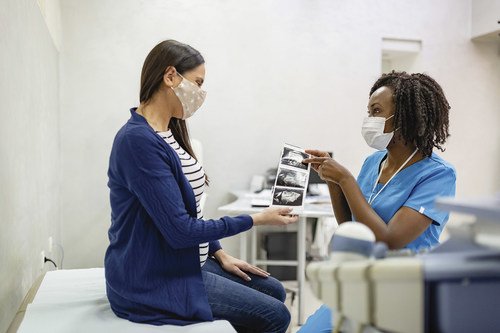5 Ways to Help Reduce the Risk of Birth Defects
04 January 2022 | Tuesday | News

Image Source : Getty Images
Each year, birth defects affect about 1 in 33 babies born in the United States, according to the U.S. Centers for Disease Control and Prevention (CDC). Mainly developing in the first three months of pregnancy as a baby's organs form, birth defects present as structural changes and can affect one or more parts of the body. They can cause problems for a baby's overall health, how the body develops and functions, and are a leading cause of infant death.
"It's critical that women who are planning to conceive or are pregnant adopt healthy behaviors to reduce the chances of having a baby with birth defects, which are a leading cause of infant death," said Dr. Zsakeba Henderson, March of Dimes senior vice president and interim chief medical and health officer. "We also encourage these women to get the COVID-19 vaccine since high fevers caused by an infection during the first trimester can increase the risk of birth defects."
To help prepare for a healthy pregnancy and baby, consider these tips from the experts at March of Dimes, the leading nonprofit fighting for the health of moms and babies, and the CDC:
- Have a pre-pregnancy checkup. Before you become pregnant, visit your health care provider to talk about managing your health conditions and creating a treatment plan. Talk about all the prescription and over-the-counter medicines, vitamins and supplements you're currently taking.
- Get vaccinated. Speak with your health care provider about any vaccinations you may need before each pregnancy. Make sure your family members are also up to date on their vaccinations to help prevent the spread of diseases.
Pregnant women are at a higher risk of severe illness or death from COVID-19 compared to those who have not been impacted by the infectious disease. Research shows babies of pregnant people with COVID-19 may be at an increased risk of preterm birth and other complications. High fevers caused by any infection during the first trimester of pregnancy can also increase the risk of certain birth defects. - Take folic acid. Folic acid is a B vitamin that prevents serious birth defects of the brain and spine. Before becoming pregnant, take a multivitamin containing 400 micrograms of folic acid every day to help ensure your baby's proper development and growth. While pregnant, increase to 600 micrograms daily.
- Try to reach a healthy weight. Talk to your health care provider about how to reach a healthy weight before becoming pregnant, as excess weight can affect your fertility and increase the risk of birth defects and other complications.
- Don't smoke, drink alcohol or use harmful substances. Cigarettes and e-cigarettes contain harmful substances that can damage the placenta or reach the baby's bloodstream. Smoking cigarettes can cause birth defects like cleft lip and palate.
It is also not safe to drink alcohol at any time during pregnancy. Drinking alcohol can cause serious health problems for your baby, including birth defects. Do not take opioids, which are drugs that are often used to treat pain. Opioid use during pregnancy can lead to neonatal abstinence syndrome, preterm birth and may cause birth defects. Consult your physician before stopping or changing any prescribed medications.
Find more resources to support your family across the lifespan at marchofdimes.org/birthdefects and cdc.gov/birthdefects.
Most Read
- Management of Relapsed/Refractory Multiple Myeloma
- 2025 Drug Approvals, Decoded: What Every Biopharma Leader Needs to Know
- BioPharma Manufacturing Resilience: Lessons From Capacity Expansion and Supply Chain Resets from 2025
- APAC Biopharma Review 2025: Innovation, Investment, and Influence on the Global Stage
- Top 25 Biotech Innovations Redefining Health And Planet In 2025
- How Health Systems Are Reshaping Drug Adoption, Partner Models, and Market Access in 2026
- The New AI Gold Rush: Western Pharma’s Billion-Dollar Bet on Chinese Biotech
- Single-Use Systems Are Rewiring Biopharma Manufacturing
- The State of Biotech and Life Science Jobs in Asia Pacific – 2025
- Asia-Pacific Leads the Charge: Latest Global BioSupplier Technologies of 2025
- Invisible Threats, Visible Risks: How the Nitrosamine Crisis Reshaped Asia’s Pharmaceutical Quality Landscape
Bio Jobs
- The State of Biotech and Life Science Jobs in Asia Pacific – 2025
- Avantor’s New CEO Ligner Aims to Unlock Global Potential and Deliver Shareholder Value
- AstraZeneca Commits $50 Billion to U.S. Expansion by 2030 in Biggest-Ever Global Investment
- Thermo Fisher, SAMRC, and South Africa’s Department of Science and Innovation Launch CATIR to Nurture Next-Gen Scientists
- Cube Biotech Appoints Former Sartorius CEO Dr. Joachim Kreuzburg to Board of Directors
- FDA’s AI Transition Marks a Turning Point in Drug Review: Industry Faces Pressure to Adapt Amid 20% Workforce Cut
- WuXi XDC Completes Mechanical Build of Singapore Bioconjugate Manufacturing Hub
News
Editor Picks











